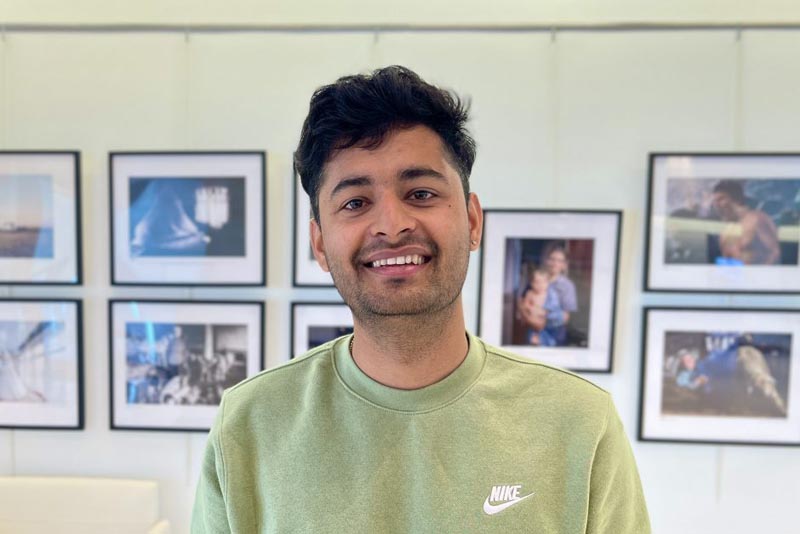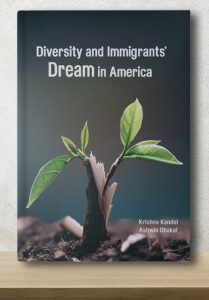November 14, 2023

By Audrey Brown | Show Me Mizzou
Imagine this: You design an artificial neural network in a computer, train it, and, within a short time period, it surpasses the intelligence of everyone on earth.
To many, this might sound terrifying. But for international student Ashwin Dhakal, the boundless opportunities presented by artificial intelligence (AI) symbolize the transformative experiences and personal growth he’s had at the University of Missouri.
Originally from Nepal, Dhakal is a third-year doctoral student studying computer science. He discovered his interest in computers at a young age while helping fix electronic devices at his uncle’s computer store. After completing his undergraduate degree at Tribhuvan University in Nepal, Dhakal chose to continue his education overseas and pursue his passion for AI.
“What truly intrigues me is the fact that AI is a black box,” Dhakal said. “While the inputs and outputs are known, the complex processes and computations occurring within the AI model are difficult to understand and still remain a mystery.”
Eager to explore this interest further, Dhakal searched for doctoral programs and experts focused on AI and other related fields. He landed upon Curators’ Distinguished Professor Jianlin “Jack” Cheng, whose wisdom and current research in machine learning and AI made the University of Missouri the obvious choice for Dhakal.
“Dr. Cheng is renowned in the field of machine learning and bioinformatics,” Dhakal said. “I couldn’t wait to learn from him.”
New beginnings
Each year, students arrive from more than 100 countries to study and research at Mizzou. The transition can be challenging, but MU’s programs for international students help ensure that they will thrive.
“The most difficult aspect of adjusting to the U.S. was finding a balance between the demands of academic life, cultural adaptation and personal well-being,” Dhakal said. “Being far away from family and friends, I missed the familiar surroundings and support systems I had back in Nepal. Luckily, Mizzou was another support system for me during that time.”
Dhakal began at Mizzou amidst the COVID-19 pandemic, which disrupted the socialization college students naturally receive when arriving on campus. However, welcome events and orientation sponsored by MU’s International Student and Scholar Services provided international students with the opportunity to get their questions answered and make new connections.
“For most of our students, orientation is actually the first time that they’ve stepped foot on our campus,” said Kristen Colbrecht, director of International Student and Scholar Services. “Our Welcome Week starts the week before classes begin, and we have information sessions for graduate and undergraduate students tailored for each degree level. We want to help students navigate their immigration status, support them with issues that come up and collaborate with campus departments for programming that helps students find their place.”
Dhakal also got involved with the University of Missouri Nepalese Student Association (MUNSA). This year, he’s serving as the president of MUNSA — helping incoming Nepalese students settle into their new environment while working to preserve Nepalese culture in the U.S. Dhakal is also the director of programming for the Graduate Professional Council (GPC), the voice of graduate and professional students at MU, where he is responsible for orchestrating all events hosted by the organization.
“We have a lot of international organizations, and I’ve gotten to know a lot of people,” he said. “I feel like I’ve grown every year.”

Giving back
Dhakal hasn’t just been finding success in his social life — he has also been thriving in the lab.
After choosing MU for the opportunity to work with Cheng, Dhakal has been able to fulfill this aspiration and perform his doctoral lab research alongside the professor. His research focuses on bioinformatics and machine learning and involves designing human brains on computers to see how the drugs that humans ingest interact with their bodies.
Dhakal has even used the experiences and skills he’s obtained at Mizzou to write his own book, “Diversity and Immigrants’ Dream in America,” which provides wisdom about immigrants’ and international students’ struggles, challenges and opportunities in the U.S.
Pictured on the front cover, Dhakal points to an image of a tree he created using AI. Initially ripped from its base, a new sprout is emerging from the tree’s center, a depiction of the hope and ambitions of international students coming to the U.S.
“The most rewarding aspect of seeing myself grow at Mizzou is the sense of accomplishment and self-assurance that comes with it,” Dhakal said. “Witnessing my progress in terms of knowledge, skills and personal development is incredibly fulfilling. It gives me the confidence to face new challenges and aspire to make a positive impact, not only on my own life but also in my surroundings and beyond.”
This story originally appeared on Show Me Mizzou.